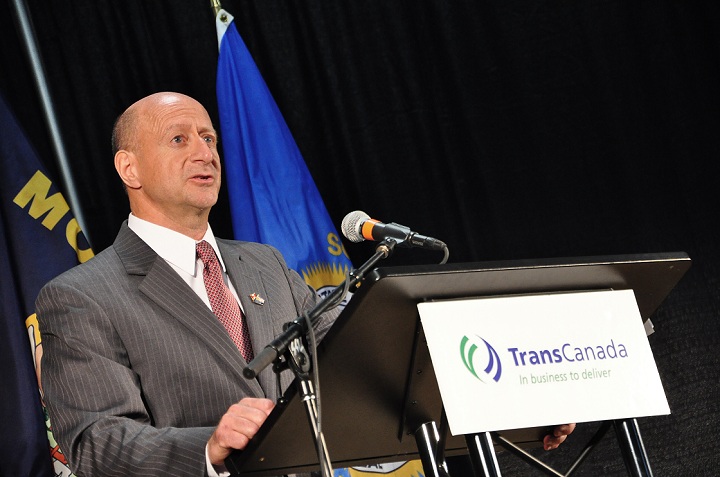SAINT JOHN – Dogged by pipeline setbacks – B.C.’s rejection of the Northern Gateway and delays to Keystone XL in the United States – Alberta Premier Alison Redford was in New Brunswick this week selling a plan to pipe oil from Alberta’s oil sands to Saint John’s Irving Oil refinery.

An enthusiastic Redford outlined the pipeline’s relevance to Canada’s international market in her speech given to the New Brunswick legislature in Fredericton Friday morning.
“The choices we have to make are about whether or not we’re going to be able to continue to fund a public health care system, a public education system, to be able to continue to invest in wonderful universities to educate generations to come and to diversify our economy” she said after her speech.
Redford’s speech was followed by a tour of Irving Oil and a meeting with the city’s board of trade. Her visit comes after New Brunswick Premier David Alward visited Alberta to tour the oil sands in February.
Calgary-based energy company TransCanada Corp. is seeking commitments from shippers to convert a pre-existing natural gas pipeline to carry oilsands crude to Quebec. Redford and Alward discussed the possibility of extending that pipeline another 1,400 kilometres to Saint John.
So far, the pipeline has received support from the federal government, NDP opposition and Quebec Premier Pauline Marois.
With everything going so well, one must ask: What makes the Energy East pipeline so different from Northern Gateway and Keystone?
- Roll Up To Win? Tim Hortons says $55K boat win email was ‘human error’
- Ontario premier calls cost of gas ‘absolutely disgusting,’ raises price-gouging concerns
- Bird flu risk to humans an ‘enormous concern,’ WHO says. Here’s what to know
- Election interference worse than government admits, rights coalition says
Well for one, it presents more obvious economic benefits to provinces outside Alberta. According to Dinara Millington, research director of the Canadian Energy Research Institute, provinces like Quebec and Ontario benefit from potential short-term employment and stave off potential job losses from the closing of refineries.
“Quebec is in an interesting spot. There’s a clear economic benefit for Quebec to approve the pipeline” Millington said.
She also suggests that perhaps there’s less opposition because, for much of the route, most of the pipeline infrastructure is already there – an advantage Northern Gateway didn’t have.
“People in New Brunswick are probably less environmentally sensitive than those in coastal BC. This may be due to the history of the region where energy development had occurred for many years, or the current unemployment rate” she said.
The pipeline proposal is still subject to pending regulatory approvals and environmental reviews, according to Natural Resources Minister Joe Oliver.
Proponents of the west-east pipeline (also called the Energy East Pipeline) say the project has many economic benefits for the provinces. Redford said this includes an increase in Alberta’s revenue, which slid about $6 billion this year due to Alberta’s lack of access to coastal shipping routes.
They also say the project will make Canada more energy independent, able to refine its own oil instead of shipping raw crude out of the country. “This particular project, assuming it achieves regulatory approval, will lessen or perhaps eliminate dependency on higher costs of foreign oil,” Oliver said.
Proponents of refining Canadian crude in Canada cite the economic benefits of making more lucrative “value-added” products domestically rather than shipping out raw resources.
But some economists question whether Canada should even bother creating new refineries – especially in Alberta – when it’s simpler to export crude to countries already equipped with the tools to get the job done.
Environmentalists also argue the pipeline could put more waterways and communities at risk of potential oil spills. Some groups say oil sands bitumen emits approximately 15 per cent more carbon than regular oil, increasing Canada’s overall carbon emissions.
Environmentalists’ primary concern is Canada’s waterways: They worry converting a gas pipeline to oil has the potential to pollute. Oilsands extraction involves using massive amounts of water as an essential energy resource, using approximately 3 barrels of water per barrel of oil. Though Alberta Environment requires mandatory water quality monitoring to keep natural resources like the Athabasca River clean, bitumen from exposed oil sands does seep into the river. The Government of Canada and the Government of Alberta came together in 2012 to create the Joint Canada/Alberta Implementation Plan for Oil Sands Monitoring.
That, coupled with a history of being prone to corrosion and leakage , is one of the many reasons why environmentalists oppose this pipeline development.
Other potential hurdles for the Energy East development are individual refineries along the pipeline’s intended path. These refineries are small and have limited capacity to refine bitumen.
If the development goes forward, it can begin shipping approximately 850,000 barrels of oil per day starting in 2017.
TransCanada Corps. has until June 17 to secure binding commitments from shippers before plans can go through.




Comments